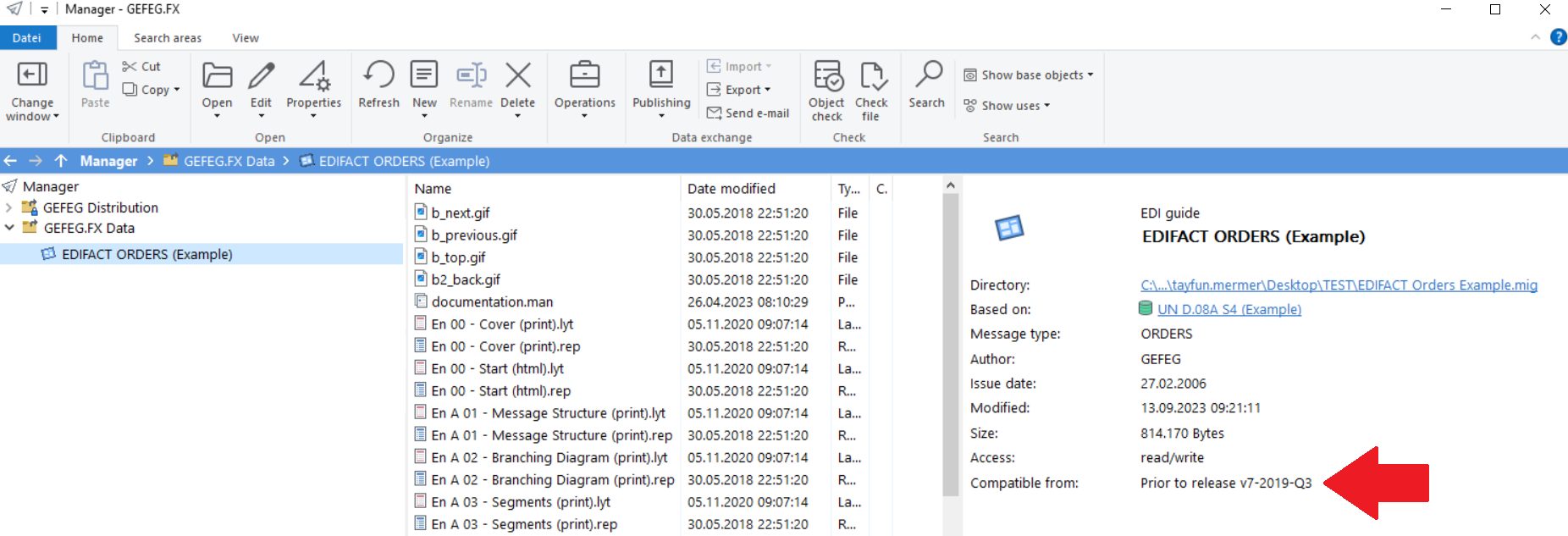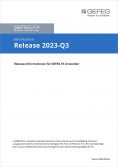GEFEG.FX – New in the 2023-Q3 Update
With the new GEFEG.FX GEFEG.FX Quartarly Release 2023-Q3, the following new or further developed functionalities are available for use.
New data packages in GEFEG.FX
- UN/EDIFACT
- UN/EDIFACT D.22B
- UN/EDIFACT D.22A
- UNECE / ISO code lists update
- UN Locode 2022-2
- ISO 20022
- Model & schema 2023-07
- External code lists 2023-07
- Models and schemas 2023-03-21
- Code lists update
- GS1 eCom standards
- GS1 Semantic Data Dictionary (SDD): Despatch Advice
- GS1 XML 3.5.1
- GS1 Application Guidelines 9.3
- GS1 XML update for code lists and example values
- GS1 XML enriched with codes, as of 3.0
Using JSON schema for EDI: Advanced integration with the new GEFEG.FX JSON Editor
Times change and this is usually accompanied by new requirements. This naturally also affects the electronic exchange of business data, and here in particular new technical exchange formats as a supplement to the classic EDI and XML formats. For some time now, GEFEG.FX’s range of services has been enriched by its own API Editor.
With the new release, a JSON editor is now also available and offers a powerful way to design, customise and reuse customer specific data structures in JSON format.
For more information, see the following article: Now ready for use for GEFEG.FX users: The JSON Editor
UN/EDIFACT syntax versions consolidated!
With the publication of the UN/EDIFACT Syntax Verison 3 Part 11, users of the UN/EDIFACT standard will be able to use selected fields of syntax version 4 in syntax version 3, among others. This new syntax is implemented in GEFEG.FX as of the D.22A release.
Users now have the possibility to choose between the following syntaxes:
- Syntax 3,
- Syntax 4 and
- Syntax 3 Part 11
In short, the new syntax allows compatibility between the previous syntaxes.
We would be happy to discuss what this means for your EDIFACT based guides and whether there is a need for action in a non-binding meeting. Get in touch with us!
New functions require new data format versions
What would software be without constant further developments, functional enhancements, bug fixes and, in the case of GEFEG.FX, new data modules? Of course, this is a purely rhetorical question, because we are constantly implementing new customer requirements or expanding existing functions.
Sometimes you as a user will be prompted by a pop-up to update the data format version in your GEFEG.FX version due to an innovation: If possible, always save your GEFEG.FX Guides in a current data format version immediately in order to be able to use the newly provided functions and improvements.
You can read the current data format version of your GEFEG.FX object in the GEFEG.FX information area.
The next practical case will follow with the next release. With regard to EDI guides and EDI standards in particular, the following applies: With the next 2023-Q4 release, these will only be able to be processed with the data format version from 2019-Q3. GEFEG recommends that you update the data format version of your files before the next release upgrade so that you can continue to work seamlessly with your EDI guides.
Please also note the following information:
Regardless of the specific situation of the 2023-Q4 Release, we would like to point out, in connection with the data format version that all GEFEG.FX users within an organization should use the same GEFEG.FX release version to avoid compatibility problems. Under certain circumstances, it could otherwise happen that GEFEG.FX objects saved with a newer GEFEG.FX version cannot be opened with older GEFEG.FX versions.


